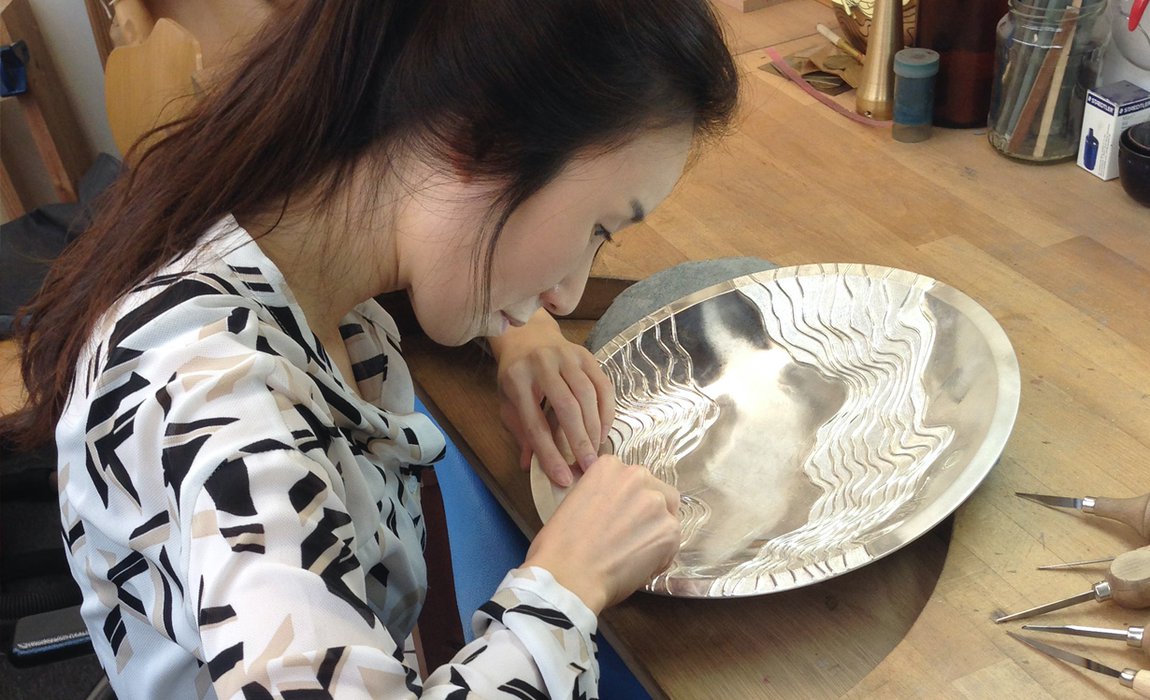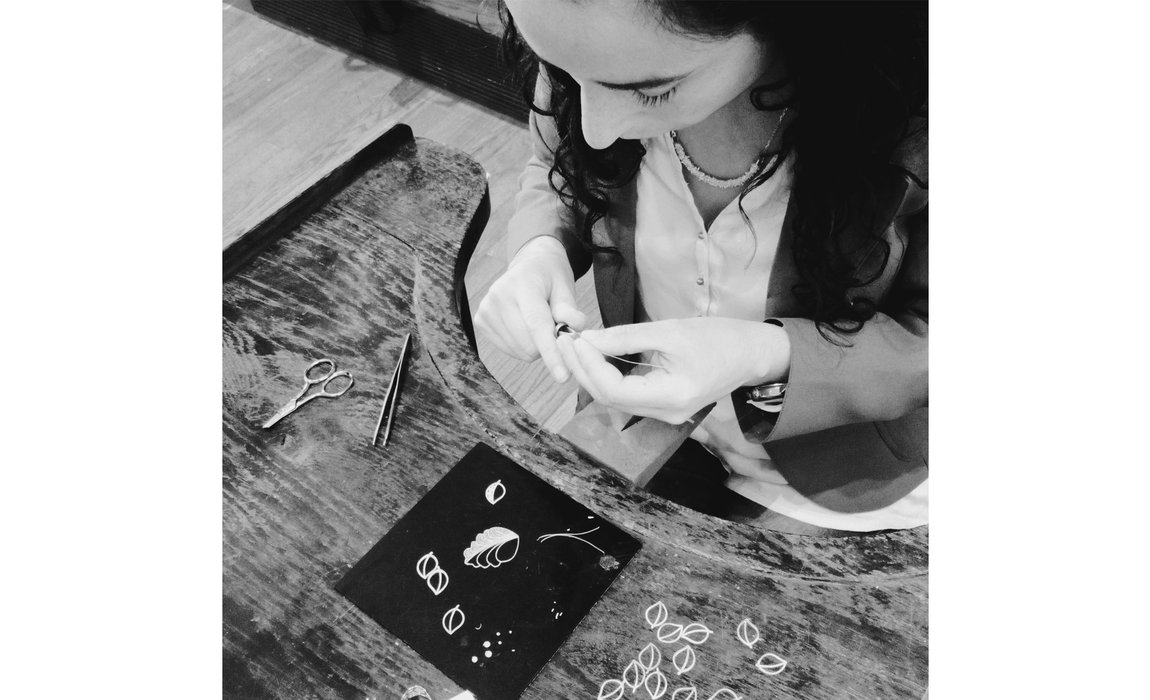What are Career Catalyst Grants? Interview with Julia Skilton
Makers entering the middle-stage of their careers are often at a pivotal point in the development of their professional and creative practice. Amidst the demands of daily life and busy working schedules, however, their freedom to explore new creative avenues may be hindered by financial or practical limitations.
Recognising the obstacles faced by those in the mid-career stage, in 2020, the Goldsmiths’ Centre launched the Career Catalyst Grant, a flexible award of up to £5,000 for makers with five or more years of experience in the silversmithing, jewellery or allied trades.
What are Career Catalyst Grants? with Julia Skilton
These grants enable makers to take a dedicated period out of their daily routines in order to embark on a journey of creative or professional discovery - experiences that may prove to be ‘catalysts’ in the overall arc of their careers.
“Career Catalyst Grants build on work that we have previously done supporting makers learn new skills and develop their work but we wanted to create a new opportunity that was a bigger career intervention. Through the community of the Goldsmiths’ Centre, and particularly the Trade Advisory Subcommittee, we identified that innovation and the opportunity to incorporate this in your work were limited when you are in the mid-career stage in particular. So, this became a real focus for us”
– Julia Skilton, Education and Partnerships Officer at the Goldsmiths Centre
Grants are tailored to each individual maker and their chosen area of exploration, which might take the form of international travel for the purposes of research towards a particular project, experimentation or collaboration with other makers, or technical or business training within the Goldsmiths’ Centre’s network of craftspeople. The prestigious panel of industry experts charged with selecting the Grant’s recipients each year are open to any proposal with the promise of significant career expansion, that may enrich the recipient with specialist skills or knowledge, widen their client base or open up new exhibition or selling opportunities. In return, the recipients commit to contributing to the Centre’s charitable mission by teaching on skills short courses, speaking as part of talks programming or mentoring emerging makers.

“The Career Catalyst Grants are very much a partnership. They are designed as a flexible grant driven by the maker. We rely on them to evolve the aspect of their work that they would like to develop. For example, this could be travel, it could be research, it could be developing a new line of work, it could be collaborating with new makers. We know that makers are individual, all of their work is individual, the business model is individual, the stage of their career will be very different. Flexibility is the key.”
Early in 2020, the application window for the Career Catalyst Grant programme was extended by two months in response to Covid-19, giving applicants time to adapt their project proposals in the wake of the pandemic. In spite of the obstacles the crisis presented, in May 2020 the Goldsmiths’ Centre was still able to award Career Catalyst Grants to four makers with exciting pitches for career growth; including jeweller and filigree expert Filipa Oliveira, jeweller and Whitby Jet specialist Jacqueline Cullen, contemporary silversmith Kyosun Jung and jeweller, chain-maker and wire-drawer Lucie Gledhill.
“COVID-19 has had a big impact so far, but it hasn't stopped the Career Catalyst Grants from going ahead, and in fact, lots of interesting things are happening as a result.”
For Jacqueline Cullen and Lucie Gledhill, who were each awarded a Grant for mentoring projects, the adjustments made in response to the pandemic have even had unforeseen positive outcomes. Jacqueline, a jeweller who specialises in lapidary, stone-cutting and carving, and whose work has featured both domestically and internationally in Vogue, was awarded a Grant to further develop her understanding and skill in manipulating Whitby Jet - an organic stone derived from ancient mudstone formations in Whitby, Yorkshire.
“Whitby Jet is so specialised, and Jacqueline has been working in it almost exclusively for a period of time now. Through the Grant, she will develop new skills, with a focus on how those skills will be passed on to the next generation, and being as innovative with the material as possible. There's real longevity and sustainability and in her approach.”
Whilst the multi-faceted project initially proposed multiple trips between London and Whitby, when all but essential travel came to a halt in the UK, digital communication and the exchange of materials through the post became more than adequate substitutes for Jacqueline and her mentor.

Filipa Oliveira was also awarded a Grant that focuses on a specialist skill - filigree jewellery. She plans to forge a network of filigree practitioners who bring a contemporary approach to the ancient craft, and who, through various channels, can contribute to a book on the subject. This will not only enhance the jeweller’s own proficiency in the technique, but will also make a niche craft more accessible to the industry as a whole.
“Through Zoom and WhatsApp and the posting parcels of materials and samples, recipients are able to keep mentoring relationships going in an unusual way - a way that wouldn't be very feasible before the pandemic. There are more interactions, and they’re taking place over a longer period of time than perhaps would be allowed by shorter visits.”
This is equally true of fellow Grant recipient and jeweller Lucie Gledhill, who’s mentorship spans an even broader geographical divide - between Italy and England - as she undergoes guidance from Giovanni Corvaja, a master goldsmith renowned for his fine wire work, which is also Lucie’s area of speciality.
“Lucie is focusing on a very distinct, innovative project on wire work with nitric acid; it's extraordinary. She is being mentored by Giovanni Corvaja, who is a celebrated artist-Goldsmith, and it’s fascinating what she is going to be able to achieve, including making a necklace specifically for the project, which will likely lead onto more work and collections.”
“Traditional filigree work is well-known, but the contemporary angle is something new.”
Only one proposal has been postponed due to its focus on international travel - that of silversmith Kyosun Jung, who hopes to enhance her already vibrant, expressive work by exploring the silversmithing industry in Korea and Japan, before traveling to New York to expand the market for her pieces. In addition to visiting universities during her time in Asia to research international systems of education, she also will speak with renowned makers such as Hiroshi Suzuki.
“Kyosun Jung’s project has many approaches. It involves developing new enamelling skills in the UK with enameller Jane Short, and also has a fascinating international element. For the Grant recipients, the outcome is more important than the time scale, it doesn't matter if they're going to deliver one year later, it's still going to be an impactful and worthwhile project.”
Applications for Career Catalyst Grants are now open and will close on Monday 19 July at 5pm.